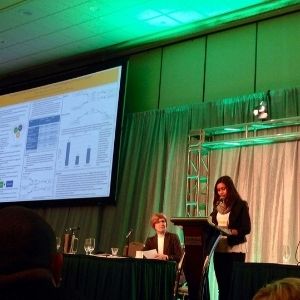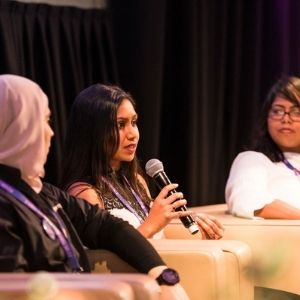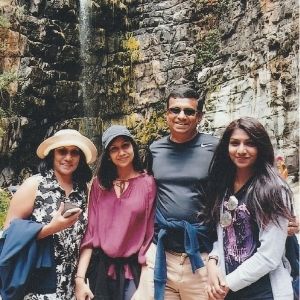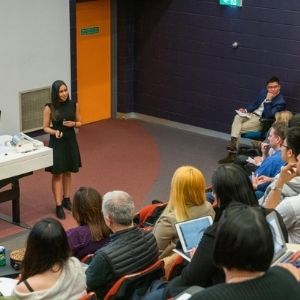To understand the world, Rav Fernando believes you need to know yourself. And for this accomplished psychology graduate from the University of Melbourne, purposeful introspection has been a guiding force for change.

The world can be a polarising place. And few understand that better than Rav. Raised and educated on two continents, Rav's life has been shaped by two very different cultures. Curious to understand how personal beliefs shape societal behaviours, Rav focused her energies on examining why people with deeply held views behave the way they do as part of her psychology degree at the University of Melbourne.
We caught up with Rav to discuss her findings, how those same human impulses influence technology, how personal adversity has helped reframe her definition of success, and why every problem has a purpose.

Hi Ravini. Congratulations on obtaining your Doctorate in Psychology recently. With this achieved, what’s next for you?
I'm a Senior Consultant at a management consulting firm. A lot of the work we do is helping clients solve some of their biggest technology challenges. We explore how we can improve customer experiences by enhancing or innovating our client's technology. No two days are alike, and I find that really fitting for the kind of person I am.
That interface between psychology and technology sounds fascinating. Can you expand on that a little?
A lot of people think technology is an end point. But fundamentally, technology is a means to an end. Of course, it can enhance what needs to be done, but without people, technology is useless. And sometimes, technology might not be the solution at all. I think that's where psychology can help. We like to look at problems from a people-centred perspective first. I really enjoy thinking about how technology can positively impact lives.
What attracted you to study psychology at the University of Melbourne?
My original degree wasn't in psychology. I initially came to study biology and medicine with the goal of becoming a doctor. But thanks to the University of Melbourne model, I discovered psychology in my first year as a breadth subject. The research, the lectures, the calibre of work, the student outcomes – all of it was incredible. I absolutely loved it, so I switched degrees.
How do you think your Melbourne experience played a role in what you do now?
I'm so grateful for the Melbourne model. It really allows you to explore subjects you may not have thought of to help find the things you are passionate about. I did subjects in science, psychology, business, economics, marketing and management. It means you aren't locked into something when you're 17 or 18, and don't know what you want to do.

What do you see as some of your biggest achievements?
As I began my PhD in 2017, I was diagnosed with a chronic condition. Enduring the pain that came with the diagnosis in those first eighteen months were tough. The support I received – from family, friends, the faculty and my PhD supervisor – was amazing. Overcoming the illness, living away from home, and still being able to publish papers, complete my degree and secure a job… I regard that as my biggest achievement.
What is the most valuable life lesson you have had so far?
Every problem has a purpose. I've written that on my blackboard, and I always return to it when I get frustrated. When things go wrong, there's a natural tendency to ask why it's happening to you. But even if I feel that, I try instead to think I don't need to know why. I'll figure it out eventually, but right now is an opportunity to solve the challenge. It's a mantra that keeps me pushing on through hard times.

What’s the one thing that's helped you get where you are today that's not on your resume?
My family are dual citizens of Sri Lanka and Australia and we lived in Australia at several points throughout my childhood. I think the moving back and forth between both countries played a significant part in getting me to where I am today. My exposure to the discipline and values of Sri Lanka's collectivist culture, coupled with the independent and open ways of thinking that come from Australia have given me the best of both worlds. I’m so grateful to my parents for giving me that opportunity.
Can you talk to your work on practical advocacy?
What I studied throughout my PhD was a concept called self-persuasion. It's how people can unconsciously persuade themselves to believe in something, even if those beliefs aren't helpful to them. The question I asked was, is it possible for people to be less polarised in their views? Not with the goal of changing their opinion but in opening up to an opposing view. And it's a question that applies to a whole range of topics, from migration and vaccination through to climate change. What I discovered was when people are invited to frame their views through a practical or economic lens rather than a purely moral standpoint, they're more likely to question their attitude and seek out opposing views.

What advice would you give to students about to begin their careers?
Cultivate self-awareness. Before you jump in and make decisions, even before you figure out what you want to do, it's important to know who you are. What do you value most in life? What, specifically, does success look like for you? What are you passionate about? Where do you see yourself in the future, both professionally and personally? If you don't define these for you, someone else (or society) will.
What does success look like for you?
I used to define success by what I had achieved. I had always viewed success as something tangible – a degree, a job, an accolade. But my experiences have changed that. These days, I define success in two ways. Firstly, as being content with where you are and what you have. Secondly, doing something, big or small, that will have a positive impact in the life of someone else. I hope I can hold onto these definitions moving forward. Every other definition feels temporary.
What excites you about your future?
Technology is an industry where, by design, things are continuously changing and innovating. The establishment of the Tech Council of Australia really solidifies our nation’s potential to be a top player in this space. I'm really excited to be part of the tech revolution and help create technology that has a positive impact on society. My experience of having chronic pain has motivated me to leverage my psychology and data analytics skills to alleviate pain for others as well. I’m currently exploring how I can do this using innovative health technology.